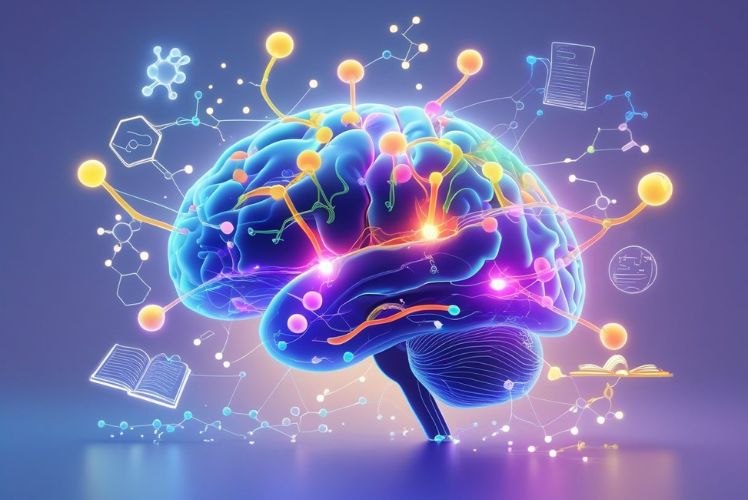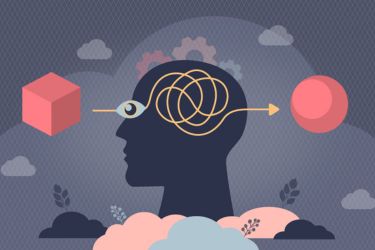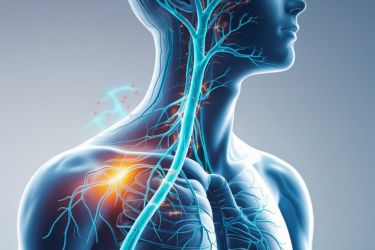Neurotransmitters are chemicals in our brains that help carry messages between nerve cells. They play a major role in how we think, feel, and act, deeply linking them to our mental health. When these chemicals are unbalanced, we may experience issues like depression, anxiety, or even more serious mental health conditions.
For example, serotonin helps manage mood, sleep, and anxiety, while dopamine is involved in feelings of pleasure, learning, and motivation. Changes in levels of these and other neurotransmitters have been connected to different mental health disorders, such as depression and schizophrenia. You can read more about this brain connection in information from the Cleveland Clinic.
Understanding the relationship between neurotransmitters and mental health can help us make sense of why we feel the way we do. By learning more, we can become better equipped to seek support or treatment if needed.
Key Takeaways
- Neurotransmitters affect how our brains and emotions work.
- Problems with these chemicals are linked to certain mental health conditions.
- Learning about them helps us understand and improve our mental wellbeing.
Understanding Neurotransmitters and Their Functions
Neurotransmitters are chemicals that allow nerve cells to communicate throughout the body. They are essential for our thoughts, emotions, and daily actions, influencing everything from mood regulation to muscle movement.
The Role of Chemical Messengers
Neurotransmitters act as chemical messengers that help transfer signals between nerve cells, or neurons. When an electrical signal reaches the end of a neuron, it triggers the release of neurotransmitters, which then cross a tiny gap to reach the next cell. This process, known as neurotransmission, is how the brain sends and receives information rapidly.
The biochemistry behind neurotransmitters also plays a part in neuromodulation, which means adjusting the strength or quality of these signals as needed. This flexibility supports processes like neuroplasticity, where the brain creates new pathways in response to experience or learning.
Types of Key Neurotransmitters
We have several important neurotransmitters that each play specific roles in mental health and body function. Here are a few key types:
| Neurotransmitter | Main Function |
|---|---|
| Serotonin | Mood, sleep, appetite |
| Dopamine | Motivation, pleasure, reward |
| Norepinephrine | Alertness, stress response |
| Epinephrine | Fight or flight response |
| GABA | Calms nervous activity, reduces anxiety |
| Glutamate | Learning, memory, main excitatory signal |
| Acetylcholine | Muscle movement, attention, memory |
| Adenosine | Promotes sleep, reduces alertness |
Imbalances in these neurotransmitters have been linked to conditions like depression, anxiety, and schizophrenia. For example, low serotonin levels are found in people with depression, while dopamine changes are seen in Parkinson's disease and addiction. For more information, we can look at how neurotransmitters impact mental health.
Neurotransmitter Pathways in the Brain
Neurotransmitter pathways are networks where specific brain regions communicate using these chemical messengers. For example, the dopamine pathway is linked with reward and pleasure and involves areas like the ventral tegmental area and nucleus accumbens. The serotonin pathway helps regulate emotion and is active throughout the brain, especially in the prefrontal cortex and limbic system.
These pathways are vital for healthy mental function. Damage or disruption in a pathway can lead to mental health challenges. Neuroplasticity allows the brain to form new connections, which is important for recovery and adaptation. The study of these pathways is a core part of neuroscience and neurobiology, helping us understand mood disorders, memory problems, and more. For a detailed overview, see how neurotransmitters work and what they do.
Neurotransmitters in Mood and Emotional Regulation

Neurotransmitters like serotonin, dopamine, and GABA play a central role in shaping mood, emotional stability, and our ability to manage stress and enjoyment. Imbalances in these chemicals are often linked to mood disorders and symptoms such as depression, anxiety, and lack of motivation.
Link Between Serotonin and Depression
Serotonin, an inhibitory neurotransmitter, helps control mood, sleep, appetite, and pain. Low levels of serotonin are often found in people with depression, including those with major depressive disorder. Studies suggest that reduced serotonin can lead to symptoms such as persistent sadness, difficulty sleeping, changes in appetite, and even suicidal thoughts.
Treatment for depression often involves medications like selective serotonin reuptake inhibitors (SSRIs), which work by increasing serotonin in the brain. These medicines help to improve mood by restoring the chemical balance. We should note that serotonin’s role extends beyond just depression and affects how we process everyday emotions and comfort with social situations. For more, see serotonin's effect on mood and emotional regulation.
Dopamine, Motivation, and Reward Pathways
Dopamine is crucial for feelings of pleasure, reward, and motivation. When dopamine levels drop, we may lose interest in activities we used to enjoy, a symptom known as anhedonia, common in depression. Changes in dopamine signalling are closely linked with the brain's reward system and motivation pathways.
Major depression is often associated with lower dopamine activity, leading to reduced motivation and drive. An imbalance in dopamine can also affect emotions like joy and euphoria. Evidence shows that disorders involving dopamine can negatively impact our mental state, making it much harder to find pleasure in daily life. Dopamine's key role in emotion can be seen in its connection to motivation and reward.
GABA, Anxiety, and Stress Response
Gamma-aminobutyric acid (GABA) is the main inhibitory neurotransmitter in the brain, helping to calm nervous activity. Low levels of GABA are linked to higher anxiety and trouble managing stress. People with anxiety disorders often have less GABA activity, leading to restlessness, fear, and difficulty relaxing.
Many anti-anxiety medicines, such as benzodiazepines, boost GABA's effect in the brain. By increasing GABA activity, these drugs help reduce anxiety symptoms and improve our ability to handle stress. A balance in GABA is essential for keeping feelings of anxiety in check and for maintaining emotional control under pressure.
Neurotransmitters and Psychiatric Disorders

Neurotransmitters play a major role in many psychiatric disorders. Changes in brain chemicals like dopamine, serotonin, and norepinephrine are linked to specific mental health conditions and often guide how we treat these disorders.
Schizophrenia and Dopamine Dysregulation
Schizophrenia is understood to be closely tied to problems with dopamine regulation in the brain. Too much dopamine activity, especially in certain brain pathways, can cause symptoms like hallucinations and delusions.
This "dopamine hypothesis" is supported by the fact that most antipsychotic medicines work by blocking dopamine receptors. These medicines help to control the most severe symptoms of schizophrenia but do not cure the underlying condition.
People with schizophrenia often have trouble with memory, thinking, and mood. These issues may also be related to imbalances in other neurotransmitters like glutamate. Research in psychology and psychiatry continues to explore how these brain chemicals work together in schizophrenia. For more information, visit this overview of neurotransmitter function and imbalance.
Anxiety and Anxiety Disorders
Neurotransmitters such as serotonin, gamma-aminobutyric acid (GABA), and norepinephrine are involved in anxiety and anxiety disorders. Low levels of serotonin and GABA can make us feel more anxious.
GABA acts as a calming chemical in the brain. When its action is too low, the brain has trouble relaxing, which can lead to constant worry or panic. Norepinephrine, which is linked to the "fight or flight" response, may be elevated in stress and anxiety disorders.
Many anti-anxiety medicines and some antidepressants work by raising serotonin or GABA activity. Psychological therapy and medication together are common treatments for these mental health conditions. Details about the role of neurotransmitters in anxiety can be found on Cleveland Clinic's page about neurotransmitters.
Bipolar Disorder and Mood Instability
Bipolar disorder is marked by swings between depression and mania. These mood changes are associated with shifts in brain chemistry, particularly with neurotransmitters like serotonin, dopamine, and norepinephrine.
During manic episodes, levels of dopamine and norepinephrine might rise, leading to increased energy and risky behaviour. In depressive episodes, low serotonin and norepinephrine are more common, causing low mood and lack of motivation.
Psychiatry recognises that stabilising these chemical messengers is a key part of treatment. Mood stabilisers and some antipsychotics are used to keep neurotransmitter levels balanced and reduce mood swings in people with bipolar disorder. Find more scientific background on the role of neurochemicals in mood disorders.
ADHD, Behaviour, and Neurochemistry
Attention Deficit Hyperactivity Disorder (ADHD) is often linked to unusual levels or action of dopamine and norepinephrine in the brain. These neurotransmitters help control attention, impulse control, and behaviour.
When dopamine and norepinephrine do not work properly, we may notice problems such as hyperactivity, lack of focus, or trouble finishing tasks. Stimulant medicines, which are the main therapy for ADHD, improve the way these chemicals work in areas of the brain needed for waiting, planning, and staying calm.
Behavioural problems related to ADHD show how important neurochemistry is in shaping a person's actions. Understanding and treating ADHD often involves a combination of psychological support and medicines that target these neurotransmitter systems. If you want to learn more, the Neurotransmitters and Mental Health Impact article gives good insights.
Cognition, Learning, and Memory

Different neurotransmitters are essential for how our brains learn, remember, and think clearly. Both acetylcholine and glutamate have unique roles that affect memory and cognitive function, as shown by research and findings from brain imaging methods.
The Role of Acetylcholine in Memory
Acetylcholine helps nerve cells send signals that support memory and attention. Low levels of acetylcholine have been found in people with Alzheimer's disease, making it harder for them to form and recall memories.
Cholinesterase inhibitors are medicines used to increase acetylcholine levels in the brain. These drugs can help slow down memory loss in some people. Studies using brain imaging, such as SPECT and PET scans, show less acetylcholine activity in patients with memory problems.
Key facts:
- Acetylcholine is vital for forming new memories.
- Alzheimer’s disease is linked to a loss of acetylcholine.
- Brain imaging can help us see problems in acetylcholine pathways.
Glutamate and Cognitive Function
Glutamate is the main excitatory neurotransmitter in our brains. It plays a key part in cognitive processes like learning and memory formation.
Long-term potentiation, which is how connections between brain cells become stronger, depends on glutamate. This process improves our ability to learn new information and store memories. Problems with glutamate signalling are linked to cognitive decline and certain brain diseases.
Neuroimaging tools, such as PET scans, have shown changes in glutamate levels in people who have issues with learning or thinking. Glutamate balance is also important, because too much can harm brain cells. We must keep glutamate at healthy levels to protect cognitive function.
Influences on Neurotransmitter Balance and Mental Health
Neurotransmitter levels are shaped by genetics, life events, stress responses, and daily habits. These factors can change our mood, thinking skills, and risk for mental health issues.
Genetic and Environmental Factors
Our genes can affect how our brain makes and uses neurotransmitters. Some people inherit gene differences that change levels or actions of chemicals such as serotonin, dopamine, or GABA. This can influence our mood, stress response, or risk for mental health disorders such as depression or schizophrenia.
Environmental factors play a major role as well. Things like exposure to toxins, trauma, or early childhood experiences can impact our brain chemistry and the way our brain responds to stress. These changes can be long-lasting through a process called neuroplasticity, which is when our brain rewires itself after experiences.
Sometimes, both genetic and environmental factors work together. For example, a person may have a genetic risk but never develop a disorder unless exposed to certain stressors in their environment.
Stress, Cortisol, and Neuroinflammation
Chronic stress triggers the release of cortisol, a hormone that helps us deal with danger but can cause harm when levels remain high. High cortisol can disrupt the balance of neurotransmitters in our brain, especially serotonin and dopamine.
Continued stress can also cause neuroinflammation, which means the brain tissues become inflamed. This state of inflammation can interrupt brain signalling and change the production or use of neurotransmitters.
Both cortisol overload and inflammation are linked to problems such as anxiety, depression, and trouble with memory or concentration. Protecting our brains against stress and lowering inflammation is important for keeping neurotransmitter levels stable.
Lifestyle Factors: Sleep, Exercise, and Diet
Poor sleep can lower the levels of key neurotransmitters like serotonin. Not getting enough rest also makes neuroplasticity slower, stopping our brains from adapting and learning.
Regular exercise helps increase dopamine and endorphins, both of which boost mood. Activity also reduces stress and inflammation, protecting our mental health.
What we eat affects our brain, too. Foods rich in vitamins, amino acids, and omega-3 fatty acids support proper neurotransmitter production. Lack of these nutrients can cause imbalances, raising the risk for mood disorders. For more, see this review on neurotransmitters and mental health.
Pharmacological and Therapeutic Interventions
Neurotransmitter imbalances are a key focus in psychiatry, as they strongly influence mental health conditions. Treatments target these chemical messengers to manage symptoms and improve our quality of life.
Antidepressants, SSRIs, and SNRIs
Antidepressants are among the most common treatments for major depressive disorder and anxiety. Selective serotonin reuptake inhibitors (SSRIs) increase the availability of serotonin in the brain, which helps regulate mood. Popular SSRIs include sertraline, fluoxetine, and citalopram.
Serotonin-norepinephrine reuptake inhibitors (SNRIs) target both serotonin and norepinephrine. Venlafaxine and duloxetine are common options. Both SSRIs and SNRIs can take several weeks to start working. They are typically well tolerated, but side effects like nausea, sleep issues, and headaches may occur. In some cases, other types of antidepressants might be prescribed if first-line options do not help. Further details can be found in this guide to mental health medications.
Antipsychotics and Mood Stabilisation
Antipsychotics are essential for conditions like schizophrenia and bipolar disorder. These medications change how dopamine and other neurotransmitters work in the brain. There are two main groups: typical and atypical antipsychotics.
Atypical antipsychotics, such as quetiapine and risperidone, are more common today because they come with fewer movement-related side effects than older drugs. Mood stabilisers such as lithium are often used to manage the highs and lows of bipolar disorder. Some antipsychotics also help to prevent mood swings.
Many people need ongoing monitoring, as these drugs can affect metabolism, weight, and other bodily systems. Adjustments might be required to find the right dose or combination. Treatments like these have been shown to reduce symptoms and improve daily functioning.
Non-Pharmacological Approaches
Pharmacological interventions are not the only way to manage mental health problems. Psychotherapy, including cognitive behavioural therapy (CBT), has strong evidence for effectiveness in depression, anxiety, and other conditions. Therapy can be used alone or with medication.
Neuromodulation techniques, such as electroconvulsive therapy (ECT) or transcranial magnetic stimulation (TMS), are sometimes used if medication and therapy are not enough. Lifestyle interventions—such as exercise, healthy sleep habits, and social support—are important for long-term progress. These approaches help by supporting brain health and reducing stress.
Substance Use and Addiction
Substance use such as cocaine, heroin, or alcohol can change neurotransmitter levels and cause addiction. These drugs strongly affect dopamine and reward pathways, making withdrawal and relapse common challenges.
Treatment involves both medical and psychological support. Medications like methadone may help with heroin addiction, while therapies like CBT assist us in managing triggers and building coping skills. Long-term support often includes group therapy or self-help programmes. Recovery requires attention to both the biological and social aspects of addiction. For more on how neurotransmitters relate to addiction and mental health, see this review on mental health disorders.
Frequently Asked Questions
Neurotransmitters like serotonin, dopamine, and norepinephrine can affect mood, motivation, and stress levels. The way these chemicals work in our brains helps shape how we feel, think, and respond to treatment for mental health conditions.
How do neurotransmitter imbalances influence mental health conditions?
When neurotransmitters are out of balance, our brains may not process emotions and thoughts as they should. This can lead to mental health problems such as depression, anxiety, or mood swings. For example, people with depression often have lower serotonin levels, which can worsen feelings of sadness and low energy.
What roles do serotonin, dopamine, and norepinephrine play in depression?
Serotonin helps control mood, appetite, and sleep. Low levels are commonly linked to depression. Dopamine affects motivation and pleasure, so when it is low, we might feel less interested in activities. Norepinephrine impacts alertness and energy, and reduced amounts can also be seen in those with depression. More information about these neurotransmitters and their connection to depression can be found at WebMD: Serotonin and Depression.
Which neurotransmitters are commonly associated with anxiety disorders?
Anxiety is often connected to imbalances in neurotransmitters such as serotonin, gamma-aminobutyric acid (GABA), and norepinephrine. Low serotonin or GABA levels can leave us feeling more anxious or nervous. At the same time, higher norepinephrine might cause symptoms like restlessness or a racing heart.
How does neurotransmitter function impact the treatment of psychiatric disorders?
Treatments for psychiatric disorders often target neurotransmitters. For instance, antidepressant medicines may boost serotonin or norepinephrine levels to reduce symptoms of depression. Other medications may work by balancing dopamine or calming the effects of excess norepinephrine.
What is the relationship between neurotransmitter levels and the severity of mental illnesses?
The severity of a mental illness can sometimes be linked to how much neurotransmitter levels are out of balance. More severe symptoms may show up when these brain chemicals are far from their normal ranges. For example, very low serotonin could mean more serious depression, while big changes in dopamine might be related to stronger psychotic symptoms. For more on this, see Neurotransmitters and Mental Health.
Can the regulation of neurotransmitters lead to improved mental health outcomes?
Regulating neurotransmitter levels may improve mood, reduce anxiety, and help us think more clearly. Many mental health treatments, like medication or therapy, try to restore the right balance of these chemicals. Successful regulation has been shown to help people feel better and function more well in daily life.





















